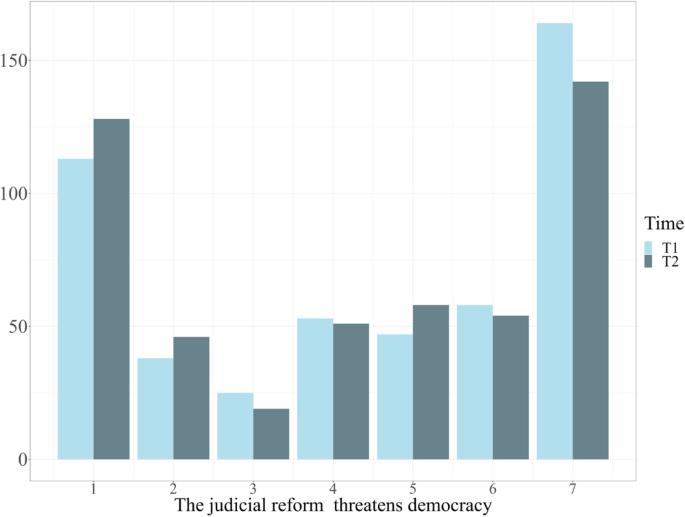Exploring motivated reasoning in polarization over the unfolding 2023 judicial reform in Israel
引用次数: 0
Abstract
This work explored polarization over Israel’s Judicial Reform, introduced in January 2023. We find that the reform divided people into pro- and anti-reform camps, which differed in characteristics such as institutional trust, patriotism, and national identity. For example, the camps disagreed about trust in the government versus the judiciary. In line with motivated reasoning—biased reasoning processes used to reach desired conclusions—people’s pre-existing characteristics motivated polarized views of the reform as a threat to democracy (issue-based polarization) and negative emotions towards opponents (affective polarization). Further demonstrating a motivated process, pro-reform participants (the electorate majority), prioritized majority rule over other democratic features (e.g., minority rights) compared to anti-reform participants. Polarization differentially predicted downstream consequences (e.g., protest methods), indicating that the camps’ reactions were motivated by the extremity of their views and negative emotions. This work extends the understanding of potentially motivated polarization processes and their immediate downstream consequences. Polarization can increase rapidly when motivated by pre-existing positions. People who supported and opposed the 2023 Judicial Reform in Israel differed in relevant characteristics, which in turn shaped their views and response to the reform.

探讨以色列 2023 年司法改革两极分化中的动机推理
这项研究探讨了以色列于 2023 年 1 月推出的司法改革的两极分化问题。我们发现,改革将人们分为支持改革阵营和反对改革阵营,这两个阵营在制度信任、爱国主义和国家认同等特征上存在差异。例如,在对政府和司法机构的信任问题上,阵营之间存在分歧。与动机推理--为得出理想结论而使用的偏向性推理过程--相一致的是,人们原有的特征促使他们将改革视为对民主的威胁(基于问题的极化),并对反对者产生负面情绪(情感极化)。与反对改革的参与者相比,支持改革的参与者(大多数选民)优先考虑多数决制,而不是其他民主特征(如少数人的权利),这进一步表明了一个动机过程。两极分化对下游后果(如抗议方式)的预测存在差异,这表明阵营反应的动机是其观点的极端性和负面情绪。这项研究拓展了人们对潜在动机极化过程及其直接下游后果的理解。在已有立场的推动下,两极分化会迅速加剧。支持和反对以色列 2023 年司法改革的人在相关特征上存在差异,这反过来又影响了他们的观点和对改革的反应。
本文章由计算机程序翻译,如有差异,请以英文原文为准。
求助全文
约1分钟内获得全文
求助全文

 求助内容:
求助内容: 应助结果提醒方式:
应助结果提醒方式:


